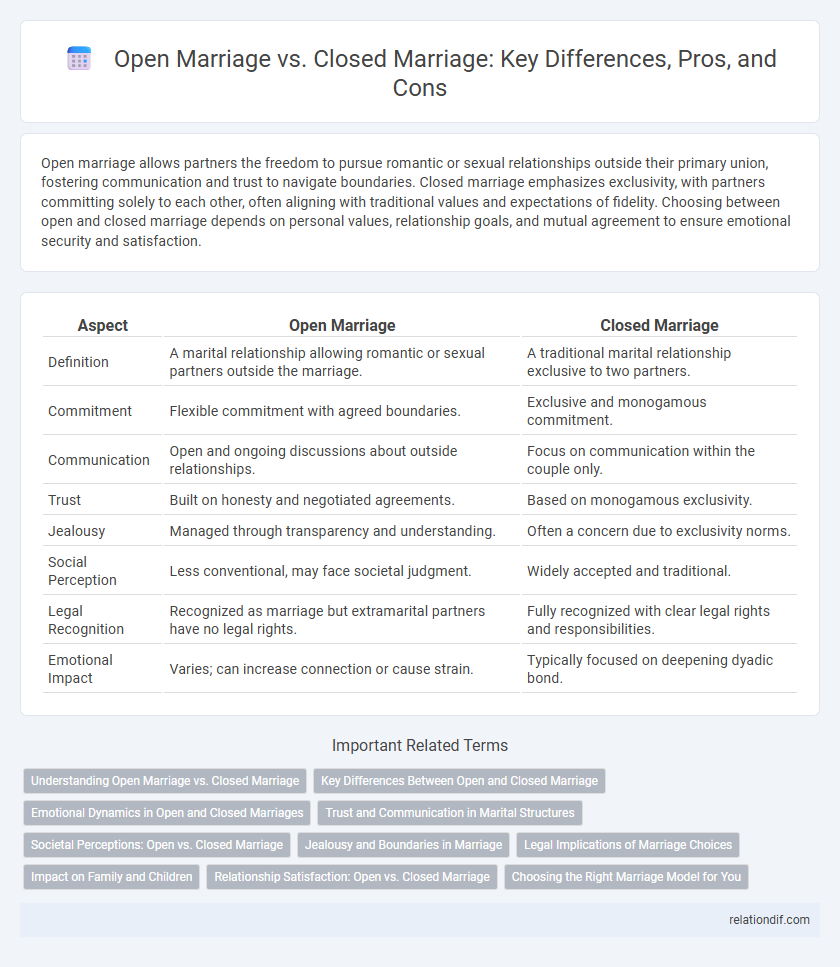Open marriage allows partners the freedom to pursue romantic or sexual relationships outside their primary union, fostering communication and trust to navigate boundaries. Closed marriage emphasizes exclusivity, with partners committing solely to each other, often aligning with traditional values and expectations of fidelity. Choosing between open and closed marriage depends on personal values, relationship goals, and mutual agreement to ensure emotional security and satisfaction.
Table of Comparison
| Aspect | Open Marriage | Closed Marriage |
|---|---|---|
| Definition | A marital relationship allowing romantic or sexual partners outside the marriage. | A traditional marital relationship exclusive to two partners. |
| Commitment | Flexible commitment with agreed boundaries. | Exclusive and monogamous commitment. |
| Communication | Open and ongoing discussions about outside relationships. | Focus on communication within the couple only. |
| Trust | Built on honesty and negotiated agreements. | Based on monogamous exclusivity. |
| Jealousy | Managed through transparency and understanding. | Often a concern due to exclusivity norms. |
| Social Perception | Less conventional, may face societal judgment. | Widely accepted and traditional. |
| Legal Recognition | Recognized as marriage but extramarital partners have no legal rights. | Fully recognized with clear legal rights and responsibilities. |
| Emotional Impact | Varies; can increase connection or cause strain. | Typically focused on deepening dyadic bond. |
Understanding Open Marriage vs. Closed Marriage
Open marriage involves consensual non-monogamy where partners agree to engage romantically or sexually with others, emphasizing communication and trust to maintain relationship stability. Closed marriage centers on exclusivity, with partners committing to emotional and physical fidelity, reinforcing traditional matrimonial boundaries. Understanding these models helps individuals choose relationship structures aligned with their values and relational needs.
Key Differences Between Open and Closed Marriage
Open marriage allows partners to engage in romantic or sexual relationships outside their primary union with mutual consent, while closed marriage strictly prohibits extramarital involvement. Communication and boundaries in open marriages are often more fluid and negotiated, contrasting with the exclusivity and commitment standards upheld in closed marriages. Trust dynamics vary significantly, where open marriages demand transparency about external relationships, whereas closed marriages emphasize fidelity and singular partnership.
Emotional Dynamics in Open and Closed Marriages
Open marriages often involve complex emotional dynamics characterized by increased communication, trust-building, and negotiation to navigate multiple intimate relationships. Closed marriages typically emphasize emotional exclusivity, fostering deep emotional intimacy and security between partners but may face challenges related to unexpressed desires or unmet needs. Understanding these differing emotional frameworks is crucial for addressing conflicts and enhancing relationship satisfaction in both marriage types.
Trust and Communication in Marital Structures
Trust forms the foundation in both open and closed marriages, influencing the stability and satisfaction within the relationship. Effective communication is critical in open marriages to navigate boundaries and address emotional needs, while closed marriages often rely on implicit understandings supported by ongoing dialogue. Research shows that couples who maintain transparent communication exhibit higher levels of trust and relationship satisfaction regardless of marital structure.
Societal Perceptions: Open vs. Closed Marriage
Societal perceptions of open marriage vary significantly from those of closed marriage, often influenced by cultural norms and traditional values. Open marriages face scrutiny and stigmatization due to perceptions of instability or moral deviation, whereas closed marriages are generally viewed as the norm, embodying commitment and exclusivity. Research highlights that acceptance of open marriage is increasing in progressive societies but remains controversial in conservative communities.
Jealousy and Boundaries in Marriage
Open marriages require clearly defined boundaries and continuous communication to manage jealousy effectively, allowing partners to navigate emotional complexities without resentment. Closed marriages typically enforce exclusivity, which can minimize jealousy by establishing clear expectations of fidelity and minimizing external romantic interactions. Both marriage types demand mutual trust and respect to maintain emotional security and relationship stability.
Legal Implications of Marriage Choices
Open marriage presents complex legal challenges, especially regarding custody, inheritance, and spousal benefits, as most jurisdictions do not recognize multiple spouses. Closed marriage offers clearer legal protections and obligations confined to two parties, simplifying rights related to property division, tax benefits, and medical decision-making. Courts often default to traditional closed marriage frameworks, creating uncertainty for partners in open marriages seeking legal recognition or enforcement of their agreements.
Impact on Family and Children
Open marriages can create complex emotional dynamics affecting family stability and children's sense of security, potentially leading to confusion or instability in traditional family roles. Closed marriages often provide a more predictable environment, fostering clearer boundaries and consistent parental roles that support children's emotional well-being. Research indicates that children thrive best in environments where trust, communication, and stability are prioritized, regardless of the marriage structure.
Relationship Satisfaction: Open vs. Closed Marriage
Relationship satisfaction in open marriages varies widely, with some partners reporting enhanced communication and fulfillment through consensual non-monogamy, while others experience jealousy and insecurity. Closed marriages often emphasize exclusivity and emotional intimacy, potentially fostering stability and trust, though they may also face challenges related to unmet needs or stagnation. Studies indicate that success and satisfaction in both open and closed marriages depend heavily on communication quality, mutual consent, and alignment of partner expectations.
Choosing the Right Marriage Model for You
Selecting the ideal marriage model depends on individual values, communication styles, and relationship goals, with open marriages emphasizing transparency and mutual consent in exploring connections outside the primary partnership. Closed marriages prioritize exclusivity and emotional fidelity, fostering deep intimacy within a single dyadic bond. Understanding personal boundaries and mutual expectations is crucial to maintaining trust and satisfaction regardless of the chosen arrangement.
open marriage vs closed marriage Infographic

 relationdif.com
relationdif.com